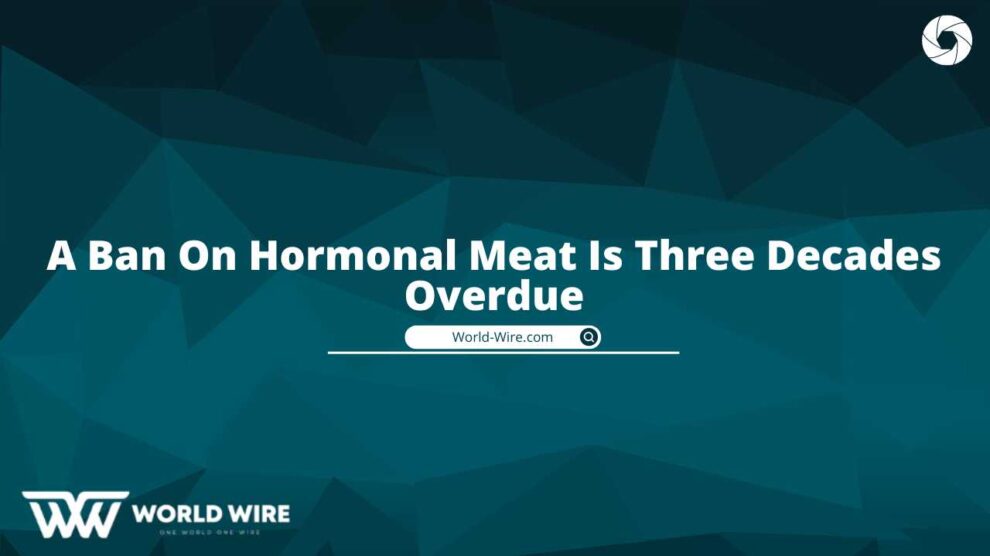In a Petition filed with the Food and Drug Administration (FDA), Samuel S. Epstein, MD, Chairman of the Cancer Prevention Coalition, along with three other scientists, sought an urgent ban on hormonal meat because it poses unrecognized risks for hormone cancer.
Among the actions requested by the Petition are:
-
In addition, producers of hormone meat must include a warning on the label such as “Produced with sex hormones, and it may increase the risk of breast, prostate, and testicular cancer.”.
-
On entry into feedlots, cows are routinely implanted with sex hormone pellets under their skin 100 days before slaughter. The purpose of the implants is to improve profitability by 10% and meat production by 50 pounds.
-
Hormones used in meat include the natural: testosterone, estrogen, progesterone, and trenbolone; and the synthetic: zeranol, melengesterol, and trenbolone.
STATEMENT OF GROUNDS
Dr. Epstein warns in the Petition that sex hormone use is associated with serious dangers to consumers, based on the scientific literature and WHO reports.
“There has been an increase in estrogen-related cancers since 1975: 23% in breast cancer, 60% in prostate cancer, and 60% in testicular cancer,” he notes.
This petition urges the FDA to act now, decades after they should have:
-
Recognize the imminent hazards of hormonal meat for the U.S. population as a whole.
-
To eliminate sex hormones from meat production, swift and long-overdue regulatory action is needed.
It is emphasized by Epstein that Dr. Roy Hertz, the former Director of Endocrinology at the National Cancer Institute and an international expert on breast and hormone cancers, warned about the risks of estrogenic cattle implants, especially those used for the breast, three decades ago.
This procedure raises hormonal levels, which increases the risk of reproductive cancer, according to Dr. Hertz.
Furthermore, Hertz warned that these highly potent biological agents could not be used in safe levels due to their essentially uncontrolled and unregulated use.
“We are experiencing an even more urgent need to warn about hormonal meat today, given that the FDA has failed for too long to do anything about it,” Dr. Epstein declares.
Dr. Epstein asserts that the FDA and USDA have provided misleading assurances on the safety of hormone-tainted meat since 1979. A longstanding conflict of interest issue among senior agency personnel and consultants is also of concern. The USDA and FDA have failed to take any regulatory actions to protect the public from hormonal meat dangers, Dr. Epstein notes, based on several investigations by the General Accountability Office and congressional hearings.
An analysis conducted by Dr. Epstein citing a 1986 report, “Human Food Safety and Regulation of Animal Drugs,” unanimously approved by the House Committee on Government Operations, concluded that the FDA “has consistently neglected its duty.” Despite its legal obligation to protect consumers, the FDA has repeatedly put what it believes to be the interests of veterinarians and the livestock industry ahead of the health and safety of consumers, putting their health and safety at risk..”
According to the USDA, less than 0.25 percent of animals tested each year proved positive for “residue violations” in response to European Commission questions on hormonal meat in February 1996. As Dr. Epstein asserts, “These criticisms remain pertinent today as well.” As a matter of fact, the Food and Drug Administration and U.S. Department of Agriculture still don’t monitor meat for sex hormone levels.
The University of Illinois at Chicago School of Public Health has named Samuel S. Epstein emeritus professor of Environmental and Occupational Medicine; he is the chairman of the Cancer Prevention Coalition. He was awarded the Albert Schweitzer Golden Grand Medal for International Contributions to Cancer Prevention, and he is the author of over 200 scientific articles and 15 books about cancer prevention and causes, including the groundbreaking The Politics of Cancer (1979), and Toxic Beauty (2010).







Add Comment